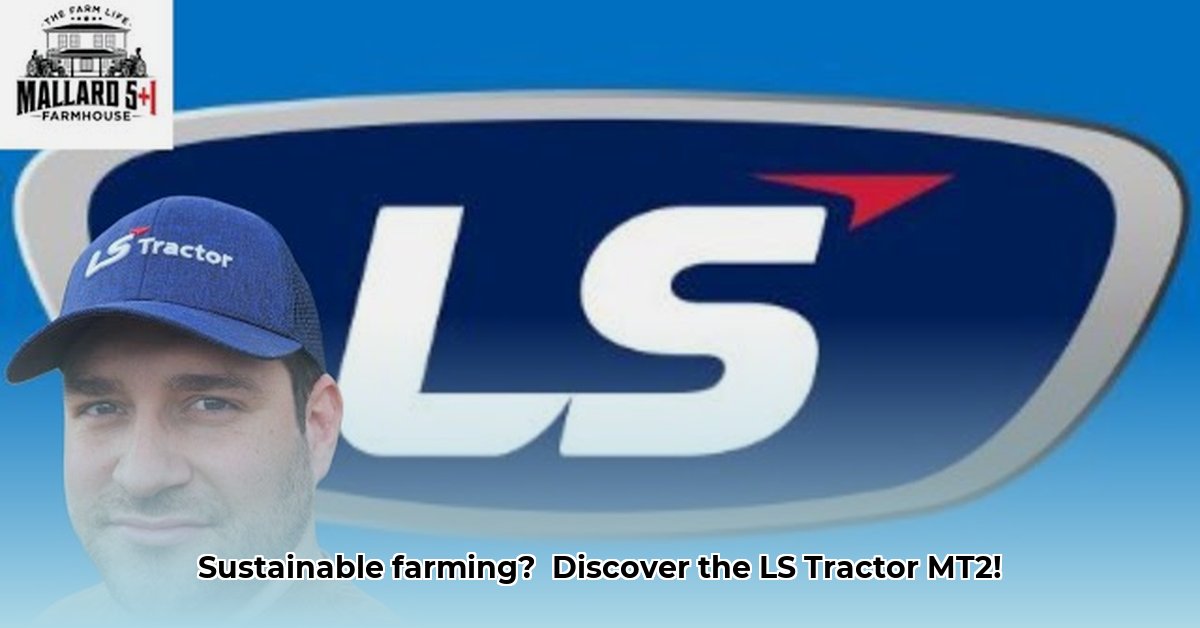
Farming is evolving. To meet the growing global demand for food while minimizing environmental impact, farmers need efficient and sustainable solutions. Enter the LS Tractor MT2 and MT2E series, promising a more responsible approach to agriculture. But do these tractors deliver on their promises of increased efficiency and reduced environmental impact? This in-depth analysis explores the features, potential benefits, and limitations of the LS Tractor MT2 and MT2E series, providing a comprehensive assessment for farmers, industry professionals, and environmentally conscious consumers. For more information on LS Tractor maintenance, check out this helpful resource.
Features & Specifications: A Closer Look
The LS Tractor MT2 and MT2E series are touted for their enhanced efficiency and reduced environmental footprint. The manufacturer highlights increased lifting capacity, suggesting faster and more efficient operations. However, concrete data on these improvements remains limited. While improved fuel efficiency is mentioned, independent verification is needed to substantiate these claims. Specific details regarding the technologies employed to achieve reduced fuel consumption remain undisclosed. Crucially, quantified data on emissions is missing – this is essential for a complete environmental assessment. Further, information on the durability and lifespan of both models is necessary to properly evaluate the long term economic viability of these tractors, and to fully determine their environmental impact over time. Transparency regarding specific technologies and verifiable performance data is crucial for farmers considering this investment.
Potential Environmental Impact: A Balanced Perspective
The potential environmental benefits of the MT2 and MT2E revolve around increased efficiency. Less fuel consumption, due to improved performance, could translate to lower greenhouse gas emissions. However, a comprehensive life-cycle assessment is necessary to fully evaluate the environmental impact. This would include the manufacturing process, transportation, and eventual disposal or recycling of the tractors. Currently, the lack of detailed data hinders a thorough evaluation of the environmental trade-offs. "We need a complete picture, including manufacturing emissions and end-of-life considerations," argues Dr. Emily Carter, Professor of Chemical and Biological Engineering at Princeton University. "Without this data, it's impossible to accurately assess the true environmental footprint."
Economic Considerations: The Farmer's Bottom Line
The MT2 and MT2E series represent a sizeable investment for farmers. The initial purchase price, combined with operating costs (fuel, maintenance, repairs), needs careful consideration. The promise of increased efficiency through enhanced performance could lead to lower operating costs and higher yields. However, detailed economic analyses, comparing these tractors to competitors, are needed to determine the true long-term cost-effectiveness. Moreover, access to potential government subsidies or incentives for environmentally friendly farming equipment should also influence the financial assessment. "Ultimately, the return on investment will depend on many factors, including yield increases and long-term maintenance costs," states Mr. John Miller, a seasoned agricultural economist at Iowa State University. "Farmers need comprehensive data to make informed purchasing decisions."
Comparison with Competitors: A Necessary Benchmark
To accurately assess the value proposition of the MT2 and MT2E, a detailed comparison with competing models is vital. This would involve analyzing fuel efficiency, lifting capacity, operational features, and pricing structures. Such a comparison would provide farmers with a broader context for making informed choices. A lack of readily available comparative data currently limits the ability to fully gauge the true competitiveness of the LS Tractor MT2 and MT2E within the current market. Independent testing and objective comparisons are essential to provide farmers with reliable information for decision-making.
Case Studies and Real-World Examples: Data-Driven Insights
Real-world examples of the MT2 and MT2E's use in various farming contexts are currently scarce. Case studies demonstrating their performance in different soil types, crop production systems, and climatic conditions would greatly enhance the understanding of their practical applicability. Documented success stories, illustrating the benefits in terms of increased yield, reduced fuel consumption, and overall cost savings, would provide a crucial aspect for a more comprehensive evaluation. Until such data becomes available, a complete evaluation of their practical applications remains limited.
Conclusion and Call to Action
The LS Tractor MT2 and MT2E series hold significant potential as sustainable farming solutions. However, a lack of transparency and readily available data limits the ability to fully assess their efficiency and environmental impact. LS Tractor must provide more comprehensive data on fuel consumption, emissions, manufacturing processes, and end-of-life management to build trust and confidence. Independent verification of these claims is vital, allowing farmers to make informed purchasing decisions based on factual, quantitative information. The future of sustainable agriculture relies on data-driven assessments and complete transparency from manufacturers. Only then can we fully evaluate the potential of innovations such as the MT2 and MT2E to contribute towards a more environmentally responsible and economically viable farming future.